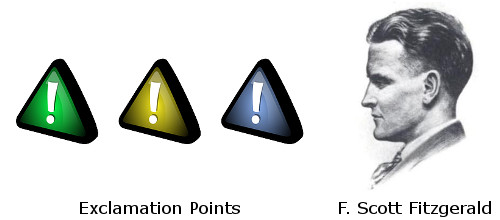Mark Twain? F. Scott Fitzgerald? Anonymous?

Question for Quote Investigator: Would you please explore the provenance of a piece of writing advice that I’ve seen several times. Here are two versions:
One should never use exclamation points in writing. It is like laughing at your own joke.
Cut out all these exclamation points. An exclamation point is like laughing at your own joke.
The first remark has been attributed to Mark Twain and the second to F. Scott Fitzgerald. Sometimes the term “exclamation marks” is used instead of “exclamation points”. What do you think?
Reply from Quote Investigator: Mark Twain did mention exclamation points in his essay titled “How to Tell a Story”, but the context only partially matched the statements above. Details are given further below.
In the final years of F. Scott Fitzgerald’s short life he began a love affair with Hollywood journalist Sheilah Graham. He acted as her mentor in the domain of literature according to Graham’s 1958 memoir “Beloved Infidel”. She wrote a five-minute script for her inaugural radio program, and she showed it to Fitzgerald who spoke the words of advice under investigation. Boldface has been added to excerpts:1
“You don’t mind if I reword it here and there?” he asked. And though tired from his own writing at the studio, he sat down with a stubby pencil and a pack of cigarettes and painstakingly—and completely—rewrote my copy. He worked with the utmost concentration and as he worked he twisted the hair above his forehead so that a tuft stood up, as on a kewpie doll. It gave him a strangely boyish appearance. “Cut out all these exclamation points,” he said. “An exclamation point is like laughing at your own joke.” He underlined words I should emphasize, corrected my grammar.
Here are additional selected citations in chronological order.
In 1898 the collection “How to Tell a Story, and Other Essays” by Mark Twain was published and the title essay discussed different types of stories: comic, witty, and humorous. Twain asserted that the humorous story was a work of “high and delicate art” and “only an artist can tell it”.
He suggested that the best humorous stories were rambling and discursive, and the teller deliberately diverted attention from the “nub” or punchline. The audience would understand the joke only after a delay. Twain contrasted the humorous story with the simpler and more direct story type which he labelled comic.2
But the teller of the comic story does not slur the nub; he shouts it at you—every time. And when he prints it, in England, France, Germany, and Italy, he italicizes it, puts some whooping exclamation-points after it, and sometimes explains it in a parenthesis. All of which is very depressing, and makes one want to renounce joking and lead a better life.
Twain was critical of “whooping exclamation-points” because they crudely overemphasized the punchline, and he prized the indirection and artistry of famous raconteurs such as Artemus Ward and Bill Nye.
In 1999 Jon Winokur released “Advice to Writers: A Compendium of Quotes, Anecdotes, and Writerly Wisdom”, and he included the guidance of Fitzgerald in slightly altered form. The words “points” and “point” were replaced by “marks” and “mark”:3
Cut out all those exclamation marks. An exclamation mark is like laughing at your own joke.
E Scott Fitzgerald
In 2011 a commentary in “The New York Times” mentioned Twain’s remark about exclamation points and added an interpretive remark about laughing:4
In an essay published in 1895 called “How to Tell a Story,” Mark Twain chastised writers who use “whooping exclamation-points” that reveal them laughing at their own humor, “all of which is very depressing, and makes one want to renounce joking and lead a better life.”
In conclusion, the advice about exclamation points in the 1958 citation was attributed to F. Scott Fitzgerald by Sheilah Graham. She published it almost two decades after the death of Fitzgerald in 1940. Nevertheless, QI believes it is reasonable to credit Fitzgerald with the comment.
Twain did write a passage about exclamation points that was thematically related to the advice under investigation. But QI believes that the match was only partial.
Image Notes: Exclamation series by Clker-Free-Vector-Images at Pixabay; series has been truncated. Image of F. Scott Fitzgerald by Gordon Bryant; published in Shadowland magazine in 1921; accessed via Wikimedia Commons.
Acknowledgement: Great thanks to Ben Blatt whose query led QI to formulate this question and perform this exploration.
Update History: On January 12, 2025 the format of the bibliographical notes was updated.
- 1958, Beloved Infidel: The Education of a Woman by Sheilah Graham and Gerold Frank, (First Edition), Chapter 18, Quote Page 197 and 198, Henry Holt and Company, New York. (Verified on paper) ↩︎
- 1898, How to Tell a Story, and Other Essays by Mark Twain, How to Tell a Story, Start Page 3, Quote Page 5, (Originally appeared in “The Youth’s Companion”) Harper & Brothers Publishers, New York. (Google Books Full View) ↩︎
- 1999, Advice to Writers: A Compendium of Quotes, Anecdotes, and Writerly Wisdom, Compiled and Edited by Jon Winokur, Section: Punctuation, Quote Page 121, Vintage Books, New York. (Verified on paper) ↩︎
- 2011 July 1, New York Times, Cultural Studies: Talking (Exclamation) Points by Aimee Lee Ball, New York. (Note: “A version of this article appeared in print on July 3, 2011, on page ST2 of the New York edition with the headline: Talking (Exclamation) Points”)(Accessed February 5, 2015 at nytimes.com New York Times archive online) link ↩︎